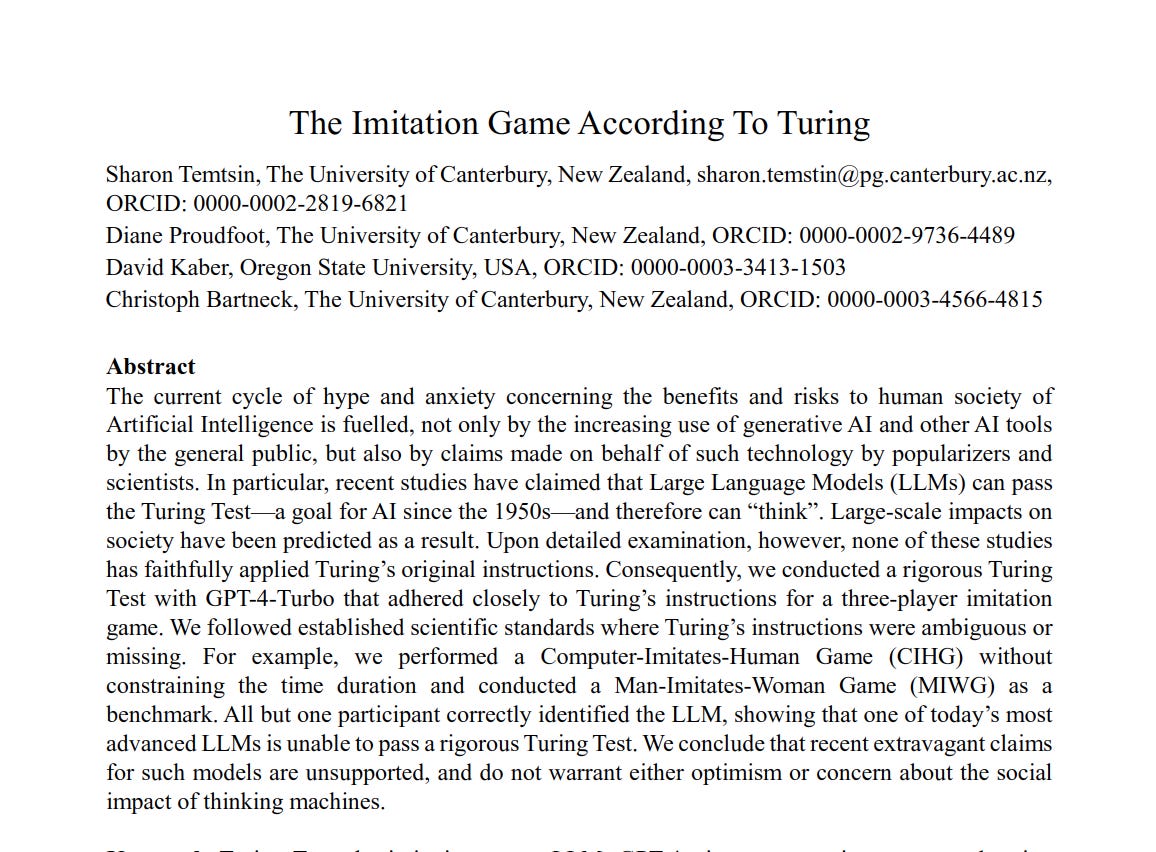"The Imitation Game According To Turing"
Below podcast on this paper is generated with Google's Illuminate.
https://arxiv.org/abs/2501.17629
The paper addresses the problem of whether current LLMs can genuinely pass the Turing Test and thus be considered to 'think', a claim amplified by recent studies but often based on misinterpretations of Turing's original test. This paper investigates if a state-of-the-art LLM, GPT-4-Turbo, can pass a rigorously conducted Turing Test, adhering to Turing's original three-player imitation game design.
The study proposes a rigorous implementation of Turing's three-player imitation game to evaluate GPT-4-Turbo's ability to pass the test, using the Man-Imitates-Woman Game (MIWG) as a benchmark.
-----
📌 Rigorous adherence to Turing's three-player game provides a robust framework. This method effectively reveals limitations of even advanced LLMs like GPT-4-Turbo. The study corrects flaws in prior Turing tests.
📌 GPT-4-Turbo's failure in the rigorous Turing Test highlights current LLMs' limitations in genuine human-like conversation. High identification accuracy (97%) in CIHG confirms this. LLMs still lack human-level deception.
📌 The paper reaffirms the Turing Test's value as a benchmark for machine 'thinking'. Unconstrained duration and three-player format are critical for valid evaluation of artificial intelligence systems.
----------
Methods Explored in this Paper 🔧:
→ This paper employed Turing's original three-player imitation game.
→ The game involves an Interrogator distinguishing between two contestants through text-based communication.
→ In the Computer-Imitates-Human Game (CIHG), one contestant was GPT-4-Turbo, and the other was a human.
→ In the Man-Imitates-Woman Game (MIWG), one contestant was a man, and the other was a woman, serving as a benchmark.
→ Participants were recruited from the University of Canterbury community, excluding experts in AI or philosophy for CIHG, and psychology experts for MIWG.
→ GPT-4-Turbo was chosen as the computer player, configured with specific parameters and a prompt to act as a human student.
→ The experiment used separate rooms for contestants and interrogators, with communication solely through a chat interface.
→ Interrogators were asked to identify the computer in CIHG and the man/woman in MIWG based on conversations.
-----
Key Insights 💡:
→ Rigorous application of Turing's original three-player imitation game is crucial for accurately assessing LLMs.
→ Many previous studies claiming LLMs passed the Turing Test did not faithfully follow Turing's instructions, particularly regarding game duration and test setup.
→ The study found that GPT-4-Turbo, a state-of-the-art LLM, failed to pass a rigorous Turing Test.
→ The duration of the MIWG was significantly longer than the CIHG, suggesting MIWG is more challenging for interrogators.
→ Game duration itself did not significantly impact the correctness of identification in either game type.
-----
Results 📊:
→ In the MIWG, interrogators correctly identified the man 43% of the time.
→ In the CIHG, interrogators correctly identified the computer 97% of the time.
→ Statistical analysis showed a significant effect of game type (CIHG vs MIWG) on identification correctness (p < 0.0001).
→ The odds ratio for game type was 42.86, indicating a substantial difference in identification accuracy between CIHG and MIWG.
→ The average duration of CIHG was approximately 14 minutes (821 seconds), while MIWG averaged around 24 minutes (1439 seconds).


